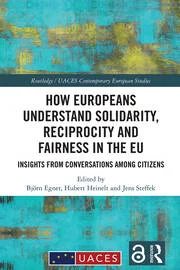Solidarity in the European Union: Results of comparative analysis of the focus group discussions
Abstract:
This chapter presents the results of the comparative analysis of the focus group discussions in the nine selected countries. It combines quantitative analysis of the dataset with qualitative interpretations, showcasing relevant differences between countries and sociodemographic groups. The chapter starts with a general overview of participants’ perceptions of transnational solidarity, relating them to the two key conceptions of solidarity identified in the beginning, namely, unidirectional support and reciprocity. Next, it outlines reasoned statements that participants provided in order to justify or deny commitments to transnational solidarity in the European Union (EU). Furthermore, it demonstrates how the reasoning of participants shifts across the three discussed scenarios: from almost unconditional solidarity in case of a natural disaster to questioning the reasons behind the financial crisis and conditionality of support in such a case, and finally, to scepticism about feasibility of common EU-level solutions for social and regional inequalities, supported with statements about subsidiarity. Overall, the findings show that, in general, participants valued solidarity as an inherent attribute of the European community. However, their commitment to transnational solidarity varied depending on the context, as participants mentioned important reservations and restrictions.


